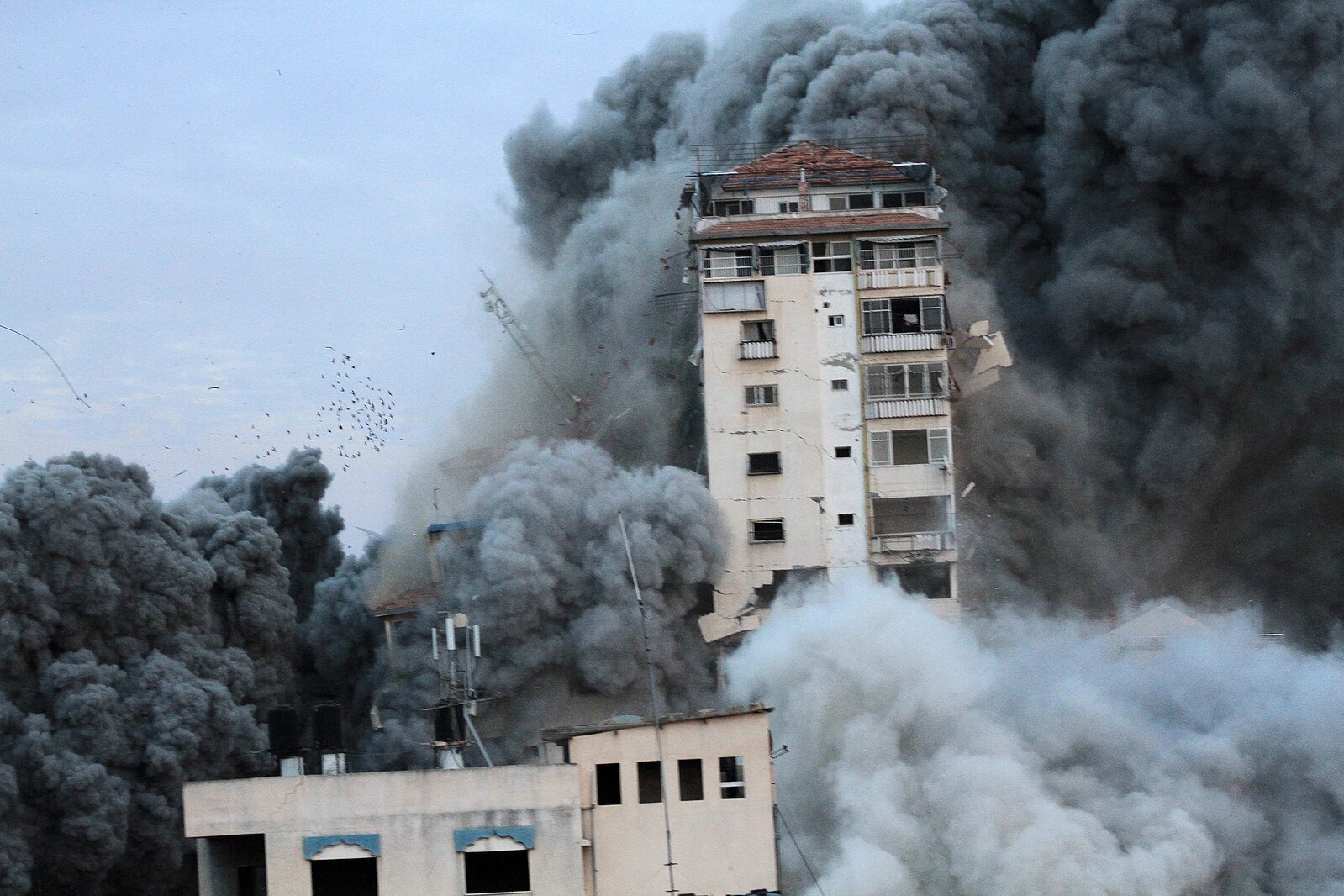By Fraser Byers & Zara Gounden – October 17, 2023

Residential areas in Gaza are targeted as the humanitarian cost of the ‘total siege’ rises. Photo (CC) Wafa
By Fraser Byers & Zara Gounden – October 17, 2023
Eight days after the horrific attack by Hamas, Israel’s Minister of Energy and Infrastructure, Israel Katz, released a statement this week that indicates the supply of water will resume in southern Gaza, part of an agreement between Prime Minister Benjamin Netanyahu and President Joe Biden.
It is not clear when water will start to flow to Gaza, though a U.S. national security official told Insider, an American news site, that “limited water has been restored.” On Monday a spokesperson for Hamas’s interior ministry, Eyad Al-Bozom, contradicted that assertion. He said that there had been no resumption of water into Gaza. Press officers for Mekorot declined to comment and referred Circle of Blue to the Ministry of Energy, which did not respond to our requests.
On October 9th, Israel reacted to the massacre by shutting down its supply of water to Gaza. Pumps and three major Gaza desalination plants also ground to a halt as the supply of fuel, too, was shut down. The actions were widely criticized as a collective punishment falling outside the laws of warfare and short of Israel’s obligations as an occupying force.
Israel is an important supplier of clean water to Gaza through Mekorot, the national water company. The 86-year-old utility operates at least three water pipelines to the Palestinian enclave. Prior to the Hamas attack, according to a post by Katz on the social media platform X, Israel supplied 14.2 million gallons a day to Gaza, about 10 percent of the daily demand. Much of the rest is drawn from the polluted Gaza Strip Coastal Aquifer, and from desalination.
Old and unmaintained water infrastructure, along with overexploitation of the reserves, has led to 96 percent of water from Gaza’s sole aquifer being deemed unfit for human consumption by the United Nations. The World Bank found that 97 percent of Gaza residents depend on unregulated private water tankers and local desalination plants, many powered by solar energy. People are reported to be digging wells near the sea and resorting to contaminated water from the salty and dirty Coastal Aquifer.
Non-governmental organizations and the European Union have stepped in during recent years to improve water security and construct modern desalination facilities in Gaza. As an occupying power, Israel remains bound by international humanitarian law to maintain safe access to water and sanitation in all of the occupied Palestinian territories.
Article 54 of the 1977 Protocol to the 1949 Geneva Conventions, a foundation to the definition of war crimes, specifically prohibits the targeting of drinking water under any circumstances including with the motive of displacing a population. It states:
“It is prohibited to attack, destroy, remove or render useless objects indispensable to the survival of the civilian population, such as foodstuffs, agricultural areas for the production of foodstuffs, crops, livestock, drinking water installations and supplies and irrigation works, for the specific purpose of denying them for their sustenance value to the civilian population or to the adverse Party, whatever the motive, whether in order to starve out civilians, to cause them to move away, or for any other motive.”
Israel has periodically skirted international law and relied on impeding water supply to punish Gaza. During the 2014 Gaza War, Circle of Blue reported on Israeli air strikes that targeted the singular power plant in Gaza. Without energy, water pumps across the territory ceased to operate. Israel also bombed water pipelines, wells, and sewage treatment plants. Palestinian authorities unassociated with Hamas condemned the targeting of critical civilian infrastructure.
Another outbreak of violence in 2021 left three desalination plants offline, cutting the water supply by 40 percent.
The motive for reestablishing the water supply specifically to southern Gaza, said Katz, was intended to compel 1.1 million civilians to evacuate the northern region in anticipation of a ground invasion by Israel’s military.
Fraser is a reporting intern at Circle of Blue. Originally from Salt Spring Island, Canada, he is now a Davis Scholar pursuing dual degrees with UC Berkeley and Sciences Po Paris. Fraser is majoring in Environmental Economics and Policy, and Politics and Government – Specializing in the MENA region.




